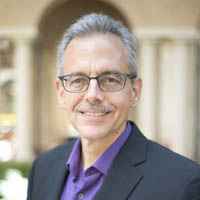Campus News
Reimagining our economy for the benefit of all
Faculty members at UC Santa Cruz and the University of Southern California released a new book that offers a road map and conceptual framework for equity-driven economic reform in the United States.

Screenshot
Faculty members at UC Santa Cruz (UCSC) and the University of Southern California (USC) released a new book, Solidarity Economics: Why Mutuality and Movements Matter, that offers a road map and conceptual framework for equity-driven economic reform in the United States.

UCSC Sociology and Environmental Studies Professor Chris Benner—director of the Institute for Social Transformation and the Everett Program for Technology and Social Change—has been collaborating for the past 20 years with USC Distinguished Professor of Sociology and Director of USC’s Equity Research Institute Manuel Pastor. Together, they use interdisciplinary research methods to study the relationship between social equity and economic growth.
While the term “solidarity economy” often refers to post-capitalist movements, Solidarity Economics, Benner and Pastor’s fifth book together, instead focuses on applying research findings to challenge traditional notions about how our current economy actually works and to envision how it could and should operate better.

“One of the key concepts we’re communicating is that it’s not the economy, it’s our economy,” Benner explained. “Our dominant conception is this idea of economic forces as being like laws of nature, when in fact, markets are fundamentally shaped by human values and legal and regulatory structures, as well as by social relationships rooted in particular places and spaces.”
Solidarity Economics argues that we can change our economy, and the types of results it produces, by changing what we prioritize. In particular, to address inequality, social divisions, and ecological destruction in our current economic and political system, Benner and Pastor say we must look beyond individualism and competition to recognize and reinforce the aspects of our economy that are already built upon mutuality and collaboration.
For example, teamwork allows companies to provide products and services. Technological innovation, meanwhile, builds upon existing collective knowledge and often involves public investment or collaboration across organizations. And the service sector and caring labor support just about all other forms of economic activity.
But Solidarity Economics sheds light on why the collaborative nature of these endeavors often goes unrecognized and uncompensated. Patents, trade secrets, and monopolies are just a few of the ways that wealth can amass in the hands of a few, despite the contributions of many. This inequality ultimately harms individuals, communities, and the economy.
“Traditional economic thinking suggests that fairness comes at the cost of prosperity,” said Pastor, who is a UC Santa Cruz alumnus and taught at UCSC from 1996 to 2007. “But a wave of new research shows that regions and nations that are more equal and less racially segregated are actually better able to sustain prosperity over time. But to get there, we need to make sure that equity is baked in, not sprinkled on.”
To bake in racial and social equity and build a more just economy, community members, policymakers, and the private sector all have a role to play. Solidarity Economics explains how better targeting of public sector investment could steer innovation toward the public good, and how social entrepreneurship, employee-owned companies, and employee share ownership could be further incentivized. The book also advocates for guaranteed public jobs and a “social wage” that would offer a baseline level of prosperity for all.
Solidarity Economics envisions a right to essentials like health, housing, and income, in recognition of the universal and sometimes hard-to-quantify ways that we all invest in collective well-being. Those investments deserve some form of guaranteed returns, Pastor and Benner say. They also argue that our economy should interact with the natural environment in ways that value future well-being, for both people and the planet.
In particular, Solidarity Economics discusses how economic progress could be decoupled from resource use through circular and regenerative economies. And the book recommends how today’s business, consumer, and policy decisions could work to minimize risk from climate change and environmental degradation.
But since there are some who benefit greatly from “business as usual” in our current economy, Benner and Pastor argue that change will require major social movements to disrupt entrenched power dynamics. The book intends to support coalition building for these efforts and argues why challenging deeply rooted structural racism is so key to forging alliances that can last.
The book is written in a format that’s meant to be accessible for the public, and it’s available as a free download. Additional resources will be released in the coming year to support broad dissemination, including a video series and a comic version of the book.
The authors of Solidarity Economics believe that bolstering and expanding movements across boundaries like political ideology, race, gender, and income could be a key turning point in achieving the book’s vision for an equitable economy.
“Movements shift power, but also, in the same way that markets often make people selfish, movements make people mutual,” Benner said. “When people start coming together to achieve common visions and values, it transforms us in ways that reinforce our investment in each other and the common good.”
The UCSC Institute for Social Transformation and USC Dornsife Equity Research Institute are co-sponsoring a virtual book launch event on Nov. 4 from 4:00–5:30 p.m. featuring Chris Benner and Manuel Pastor in conversation with prominent national policy advocates and social movement leaders. Event registrants will receive a link to download a free copy of the e-book.